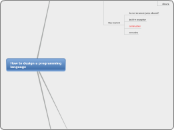How to design a programming language
semantic design
Type System
Weak Type
Strong Type
Static Type
Dynamic Type
Do we have type inference?
Which formal system based on
Is subtype allowed?
Is recusive type allowed?
Type casting mechansim
Sub-type
Programming Paradigm
Imperative
Declarative
Functional Language
Logical Language
Both?
some features
meta-programming
reflection
Storage
Programmer know the detail or not?
Is pointer allowed?
Is memory management by programmer allowed?
Scoping
Lexical Scoping
Dynamic Scoping
Both?
So-called Stackless Language
Sub Program
Is sub program allowed?
First Class?
Call Strategy
Call by name
Call by value
Is call by referance allowed?
Evaluation Strategy
Eager Evaluation
Lazy Evaluation
The sequence of Evaluation
lambda
closure
Flow Control
Is non-structure jump allowed?
build-in exception
continuation
coroutine
grammer design
Grammer is the so-called syntax
There can be SEVERAL grammers according to ONE sematics
I love lisp.... who has NO grammer at all.
Syntactic Sugar
compiler implementation
There DO exist some great compiler frontend, backend and library, so reinvent the wheel is lame...And it is even easier to use some VM as the running platform like JVM, CLI.
Grammer Analyse
u can get a parse tree from this analyse
YACC
Parser Combinator
Type Checking and Inferencing for static language
several inference algorithm
Hindley-Milner
Optimization
Especially for Functional language
Platform Independent
common subexpression elimination
copy propagation
Intermediate Code Generation
change tree-style to linear-style
if you use LLVM, JVM as backend, your job is done here
static single assignment form
3-address
Code Generation
Platform Dependent Optimization
Standard Library
Data Sturucture
Set
Array
Dictionary
It is HELL when debuging and testing compiler
we'd rather be conservatism than aggrasive
